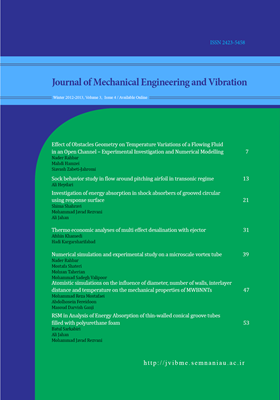RSM in Analysis of Energy Absorption of thin-walled conical groove tubes filled with polyurethane foam
Subject Areas : Vibration Transmisionبتول سرکبیری 1 * , علی جهان 2 , محمد جواد رضوانی 3
1 - دانشجو
2 - عضو هیئت علمی
3 - عضو هیئت علمی
Keywords: Finite Element Analysis, response surface methodology, Design of experiments (DOE), crashworthiness, energy absorption,
Abstract :
AbstractEnergy absorbers are used in various – especially in the automotive – industries as a solution to reduce the damages stroke on the passengers, and to enhance automobile safety. Nowadays, thin-walled tubes as one of the most efficient energy absorption systems have found increasing applications. In this study, energy absorption parameters is performed to investigate the impacts of designing variables related to thin-walled conical groove tubes using finite element analysis. However, since the output of these studies depends to methods of designing computational experiments, the design of experiments technique (DOE) is used in this study along with the finite element analysis. For this purpose a conical aluminium tube filled with polyurethane foam is simulated that the grooves are designed with a given distance on the inside and outside surfaces under quasi-static load. Objectives of the design include the specific energy absorption e (SEA), and designing variables including conical angle, grooves distance, foam density, groove depth, and tube thickness. response surface methodology (RSM) showed that the tube thickness foam density, groove depth and grooves distance, respectively and linearly relate to the amount of specific energy absorption These results can be helpful in the design of thin-walled tubes with different conical geometries.

